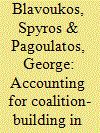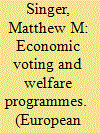|
|
|
Sort Order |
|
|
|
Items / Page
|
|
|
|
|
|
|
| Srl | Item |
| 1 |
ID:
103994


|
|
|
|
|
| Publication |
2011.
|
| Summary/Abstract |
Which parameters affect coalition building in budgetary negotiations? In this article, three distinct levels of analysis are identified to account for coalition building patterns, associated with domestic politics, domestic socioeconomic structures and EU politics. At the level of domestic politics, ideology points to cross-governmental affinity of a partisan nature; at the level of socioeconomic structures, similarity of policy interests, generated by cross-national socioeconomic convergence with EU policy standards, informs coalition formation patterns; at the EU politics level, the intergovernmental power balance influences the political aspirations of each Member State in the integration process and coalition-building decisions. Two sets of parameters affect the evolution of EU coalition patterns, corresponding to the integration impact on the EU (new cleavages) and on the Member States (the impact of Europeanisation). This analytical framework is used to examine the southern coalition (Spain, Greece, Portugal) in the four multi-annual financial frameworks (1988, 1992, 1999 and 2005).
|
|
|
|
|
|
|
|
|
|
|
|
|
|
|
|
| 2 |
ID:
103992


|
|
|
|
|
| Publication |
2011.
|
| Summary/Abstract |
Citizenship is usually regarded as the exclusive domain of the state. However, changes to the structure of states resulting from decentralisation and globalisation have required a re-conceptualisation of citizenship, as authority is dispersed, identities multiply and political entitlements vary across territorial levels. Decentralisation has endowed regions with control over a wide range of areas relating to welfare entitlements, education and cultural integration that were once controlled by the state. This has created a new form of 'regional citizenship' based on rights, participation and membership at the regional level. The question of who does or does not belong to a region has become a highly politicised question. In particular, this article examines stateless nationalist and regionalist parties' (SNRPs) conceptions of citizenship and immigration. Given that citizenship marks a distinction between members and outsiders of a political community, immigration is a key tool for deciding who is allowed to become a citizen. Case study findings on Scotland, Quebec and Catalonia reveal that although SNRPs have advocated civic definitions of the region and welcome immigration as a tool to increase the regional population, some parties have also levied certain conditions on immigrants' full participation in the regional society and political life as a means to protect the minority culture of the region.
|
|
|
|
|
|
|
|
|
|
|
|
|
|
|
|
| 3 |
ID:
103993


|
|
|
|
|
| Publication |
2011.
|
| Summary/Abstract |
This article analyses coalition survival in eleven post-Communist, Central and Eastern European democracies. Survival analysis demonstrates that Communist Successor Parties (CSPs) are central to understanding government dissolution processes in post-communism. Coalitions spanning the 'regime divide' between CSPs and parties not affiliated with the ancien regime last longer than governments that do not. Regime divide governments also are more likely to fall during periods of positive economic performance, while other governments fall during periods of negative economic performance. The reason lies in parties' incentives to prolong their regime divide coalition with the CSP, especially in the face of adverse conditions.
|
|
|
|
|
|
|
|
|
|
|
|
|
|
|
|
| 4 |
ID:
103991


|
|
|
|
|
| Publication |
2011.
|
| Summary/Abstract |
While scholars have hypothesised that a strong welfare state should reduce voters' incentives to base their votes on economic outcomes, evidence for this proposition remains mixed. This article tests whether differences in welfare protections across American states affect the relationship between economic performance and support for the president's party in 430 state legislative elections from 1970 to 1989. Analysing the results of over 42,000 contests in which an incumbent was running for re-election, it finds that while unemployment insurance programmes do not affect the importance of economic performance, the electoral fortunes of presidential co-partisans are less strongly tied to the national economy in states with generous anti-poverty programmes. Thus by reducing vulnerability to poverty, economic safety-nets lower the salience of the economy and provide electoral cover for politicians during economic slowdowns.
|
|
|
|
|
|
|
|
|
|
|
|
|
|
|
|
| 5 |
ID:
103990


|
|
|
|
|
| Publication |
2011.
|
| Summary/Abstract |
Ministerial portfolios are the most obvious payoffs for parties entering a governing coalition in parliamentary democracies. This renders the bargaining over portfolios an important phase of the government formation process. The question of 'who gets what, and why?' in terms of ministerial remits has not yet received much attention by coalition or party scholars. This article focuses on this qualitative aspect of portfolio allocation and uses a new comparative dataset to evaluate a number of hypotheses that can be drawn from the literature. The main hypothesis is that parties which, in their election manifestos, emphasise themes corresponding to the policy remit of specific cabinet portfolios are more likely to obtain control over these portfolios. The results show that policy saliency is indeed an important predictor of portfolio allocation in postwar Western European parliamentary democracies.
|
|
|
|
|
|
|
|
|
|
|
|
|
|
|
|
|
|
|
|
|